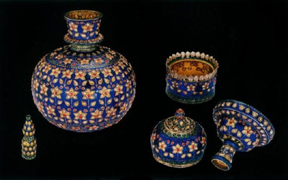 LONDON: The UK government has put a temporary export ban on an extremely rare jeweled flask worth over 6 million pounds given to former commander-in-chief of India Robert Clive after the Battle of Plassey in 1757.
LONDON: The UK government has put a temporary export ban on an extremely rare jeweled flask worth over 6 million pounds given to former commander-in-chief of India Robert Clive after the Battle of Plassey in 1757.
UK culture minister Matt Hancock has placed a temporary export bar on the items to find a UK-based buyer for the flask, at an asking price of 6,000,000 pounds, and 240,000 pounds for the huqqa set.
The governor and commander-in-chief of India during the early years of the British Raj, who is known as Clive of India, is believed to have been presented the Mughal ruby and emerald flask and the sapphire and ruby huqqa as a gift after the Battle of Plassey in 1757.
“These treasures are not only exquisite, they provide us with a glimpse into the fascinating lifestyle and traditions of the Mughal Court and the British presence in India at the time. I hope that we are able to keep these unique artefacts in the country to learn more about this extraordinary history,” Hancock said.
Clive became famous for his victory over the Nawab of Bengal during the famous Battle of Plassey. The flask itself is described as “incredibly rare” because there is no other object like it anywhere in the world. It has a silver interior and a gold exterior decorated in jade, emeralds and rubies.
The huqqa set is adorned with white sapphires and rubies and was part of an original collection at the imperial court in Delhi at the time. The huqqa set is also considered to be an extremely rare survival as such lavish courtly objects were often broken down for their component parts, the UK government’s culture, media and sport department said.
It isn’t known how Clive of India acquired the set, but smoking was widespread in India at the time and had become popular among the British living there as well, it added.
“In fact, the British often had themselves portrayed in paintings reclining against brocade-covered bolsters on a terrace, peacefully smoking,” the statement said.
The decision to defer the export license follows a recommendation by the Reviewing Committee on the Export of Works of Art and Objects of Cultural Interest (RCEWA), administered by the UK’s Arts Council.
RCEWA chairman Sir Hayden Phillips said: “Apart from the intrinsic quality of these objects, and their outstanding importance for scholarship, the Reviewing Committee was unanimous in its recognition of their emblematic significance for our history and national life”.
“Robert Clive was an outstanding and, indeed, controversial figure, but absolutely central to the creation of British rule in India. His statue, gazing out towards St James’s Park, stands guard at Clive Steps as they lead to the Foreign Office and The Treasury; a tellingly symbolic location for what he contributed to our history”.
The RCEWA made its recommendation on the flask on the grounds of its close connection with British history and national life, its aesthetic importance and its outstanding significance for the study of Mughal political and technical history, the consumption of wine and gift-giving in Mughal India, Clive of India and the British expansion in India.
Its recommendation on the huqqa set was also on the grounds of its close connection with British history and national life and on the grounds of its outstanding significance for the study of Mughal court arts, gold and silver-smithing, jewel-setting, enameling, and the place of tobacco in the social etiquette of early modern India and its adoption by British administrators in the later 18th century.
Under the export bar, the export license application for the flask has been deferred until May 17 this year and could be extended until November 17 later this year if a serious intention to raise funds to purchase it is made at the asking price.
The decision on the huqqa set will be deferred until April 17, which may be extended until July 17 under similar conditions.–PTI





